History, Art and Culture: April 2025 Current Affairs | General Test Preparation for CUET UG - CUET Commerce PDF Download
| Table of contents |

|
| Ambedkar and Gandhi: Ideological Similarities & Differences |

|
| Jyotiba Phule Jayanti 2025 |

|
| Mahavir Jayanti |

|
| Chinese Scholars to Visit Visva Bharati |

|
| Rongali Bihu |

|
Ambedkar and Gandhi: Ideological Similarities & Differences

Why in News?
As India commemorates the 135th birth anniversary of Dr. B.R. Ambedkar, reflecting on his perspectives regarding caste, democracy, and social reform provides crucial insights into the creation of an inclusive and equitable society. Although Ambedkar and Mahatma Gandhi shared a common goal of uplifting the marginalized, their methodologies diverged significantly.
Key Takeaways
- Both leaders rejected violent revolution and communism, advocating instead for non-violent approaches to social justice.
- They emphasized the importance of human dignity and social justice, albeit through different frameworks.
- While both believed in the role of ethics in public life, their approaches to morality in politics differed.
Additional Details
- Rejection of Violent Revolution: Both Ambedkar and Gandhi opposed the violent methods associated with communism. Gandhi criticized Bolshevism for its reliance on violence, advocating instead for non-violence and moral persuasion. Similarly, Ambedkar emphasized the necessity of a sustained, non-violent struggle for justice, prioritizing Buddha's message of compassion.
- Human Dignity and Social Justice: Gandhi championed Sarvodaya (upliftment of all), while Ambedkar focused on Bahujan Hitay (welfare of the majority), reflecting their respective approaches to achieving social justice.
- Caste and Varna System: Ambedkar called for the complete annihilation of caste and criticized Hindu texts like Manusmriti for justifying caste oppression. Gandhi, on the other hand, recognized the flaws in the caste system but did not entirely reject Manusmriti, viewing it as a text with both positive and negative elements.
- Separate Electorates for Dalits: Ambedkar advocated for separate electorates to ensure political representation for the Depressed Classes, while Gandhi opposed this, fearing it would further divide Hindu society. Their disagreements led to the Poona Pact, which replaced separate electorates with reserved seats for Dalits.
- Religion and Social Reform: Ambedkar converted to Buddhism, viewing Hinduism as inherently discriminatory, whereas Gandhi treated religion as a moral compass, advocating for equal respect among all religions.
- Means of Social Transformation: Ambedkar emphasized legal reforms and constitutional measures for social equality, contrasting with Gandhi’s focus on personal morality and non-violence.
- Role of the State and Constitution: Ambedkar supported state-led initiatives to address historical injustices, asserting that democracy should facilitate social organization, whereas Gandhi favored minimal state intervention and community self-reliance.
In conclusion, despite their differing ideologies, both Gandhi and Ambedkar aimed for a just and inclusive India. Their fundamental disagreements in methodology—Gandhi's moral appeals versus Ambedkar's push for state-led reforms—reflect their unique contributions to India's constitutional and social vision.
Jyotiba Phule Jayanti 2025
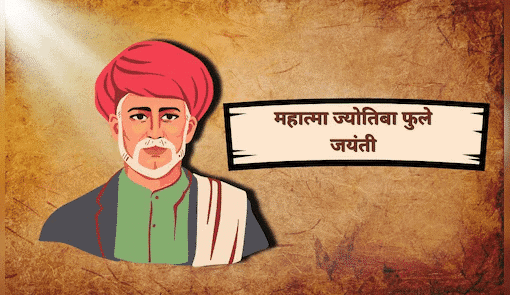
Why in News?
Jyotiba Phule Jayanti 2025 is a momentous occasion to honor the life and legacy of one of India's foremost social reformers, Jyotirao Govindrao Phule. Observed annually on April 11, this day marks his birth anniversary, providing an opportunity for individuals and institutions to reflect on his substantial contributions towards creating a just and equitable society. This year, the celebrations will recognize his relentless fight against social injustices and his commitment to promoting equality, especially in education and caste reform.
Key Takeaways
- Jyotiba Phule was a pioneer in advocating for women's education and the upliftment of marginalized communities.
- His legacy continues to inspire movements for social justice and equality in contemporary India.
- On April 11, 2025, various events will pay tribute to his contributions, including seminars and cultural programs.
Additional Details
- Event Name: 199th Birth Anniversary of Jyotirao Phule.
- Date: April 11, 2025, which falls on a Friday.
- Place of Birth: Katgun, Maharashtra, India.
- Significance: This day promotes values of equality, education, and social justice.
As we commemorate Jyotiba Phule Jayanti 2025, it serves not just as a remembrance but as a celebration of his unwavering spirit for reform and justice. His life exemplifies courage in confronting caste discrimination and advocating for the rights of the marginalized. Today, his teachings resonate with the ongoing struggles against social inequalities.
Who Was Jyotiba Phule?
Born on April 11, 1827, in Katgun, Maharashtra, Jyotirao Govindrao Phule emerged from a lower caste family and faced numerous societal challenges. He became a prominent advocate for universal education and the abolition of the caste system. His courage and vision were evident in his initiatives, such as establishing India's first girls' school in Pune in 1848, alongside his wife, Savitribai Phule.
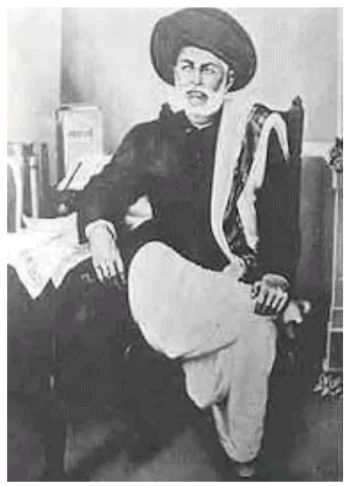
Jyotiba Phule’s Contributions
Jyotiba Phule's impact on society was profound, laying the groundwork for modern movements toward social justice, gender equality, and educational reform. His key contributions include:
- Educational Revolution: Pioneered girls' education and provided learning opportunities for the untouchables.
- Social Justice Advocacy: Founded the Satyashodhak Samaj, promoting rational thinking and social awareness among marginalized groups.
- Inspiration for Future Reformers: Influenced leaders like Dr. B.R. Ambedkar in the fight for Dalit rights.
Jyotiba Phule Jayanti 2025 thus serves as a reminder of the ongoing journey toward equality and justice in society. Celebrating this day is not merely about remembering a historical figure; it reinforces our commitment to continue his legacy of reform and advocacy.
Mahavir Jayanti
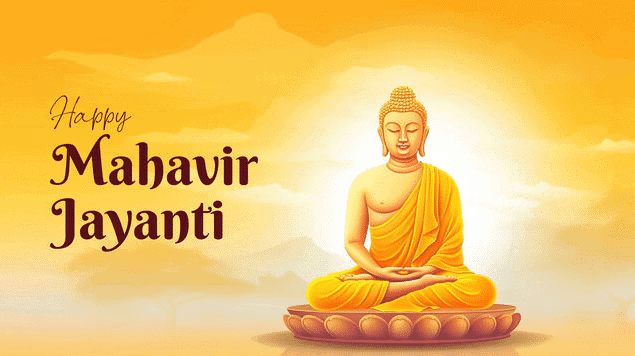
Why in News?
The Prime Minister inaugurated the Navkar Mahamantra Divas on April 10th, 2025, emphasizing that Lord Mahavir’s teachings of non-violence, truth, and compassion provide contemporary solutions to global challenges and align with the vision of ‘Viksit Bharat’.
Key Takeaways
- Mahavir Jayanti celebrates the birth of Vardhamana Mahavira, the 24th and last Tirthankara of Jainism.
- It is observed on the 13th day of the Chaitra month in the Hindu calendar.
Historical Background
About: Mahavir Jayanti, also known as Mahaveer Janma Kalyanak, is a significant religious festival in Jainism. It commemorates the birth of Vardhamana Mahavira, who is revered as a great spiritual teacher and reformer. He succeeded the 23rd Tirthankara, Parshvanatha.
Contemporary Relevance of Teachings of Lord Mahavira
- Ahimsa (Nonviolence): Advocates for the cessation of all forms of violence, promoting compassion towards all living beings. This principle is crucial in addressing global issues like armed conflicts and terrorism.
- Aparigraha (Non-possessiveness): Encourages a sustainable lifestyle and minimalism, which aligns with environmental goals such as Mission LiFE and SDG 12.
- Anekantavada: Teaches that truth has multiple dimensions, fostering respect for diverse perspectives and reducing intolerance and societal divisions.
- Satya (Truth) and Asteya (Non-stealing): Promote honesty and integrity, essential for combating corruption and unethical business practices.
- Brahmacharya (Celibacy/Self-restraint): Interpreted as self-discipline, it addresses issues like substance addiction and mental health concerns.
Chinese Scholars to Visit Visva Bharati
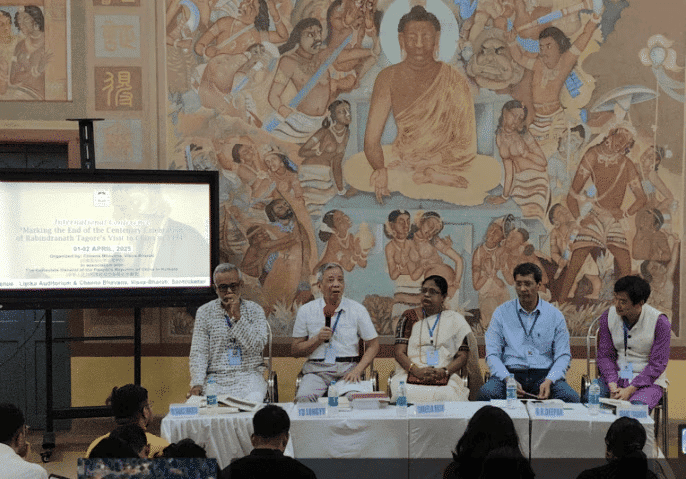
Why in News?
The Chinese Consul General in Kolkata has announced that approximately 20 scholars and experts from China will visit Visva-Bharati University on April 1, 2025. This visit is part of an international seminar honoring Rabindranath Tagore and commemorates the 75th anniversary of diplomatic relations between India and China.
Key Takeaways
- Rabindranath Tagore's 1924 visit to China symbolizes the friendship between China and India.
- The seminar at Cheena Bhavana, Visva-Bharati marks 100 years since Tagore's visit.
- This event celebrates 75 years of diplomatic ties between India and China.
Additional Details
- International Seminar: The seminar is being organized by the Chinese Consulate in collaboration with Cheena Bhavana, emphasizing cultural exchange.
- In 2024, Indian scholars and artists visited China to 'Retrace the Footsteps of Tagore,' highlighting ongoing cultural connections.
- The Chinese Consulate previously hosted a photo exhibition at Visva-Bharati in 2024 to celebrate the centenary of Tagore's visit.
Cheena Bhavana
- Cheena Bhavana: Established by Tagore and Professor Tan Yun-Shan in April 1937, it is the oldest Chinese studies department in South Asia.
- The department plays a key role in promoting historical and cultural ties between India and China.
Strengthening Ties
- The Chinese Consul emphasized the importance of enhancing cultural and academic exchanges between the two nations.
- He referred to the Indian Medical Mission to China in 1938, led by Dr. Dwarkanath Kotnis, as a significant historical connection.
- The Dr. Dwarkanath Kotnis Memorial Committee in West Bengal continues to support initiatives that foster India-China relations.
This upcoming seminar represents a significant opportunity to strengthen the bonds between India and China, honoring the legacy of Rabindranath Tagore while fostering future cultural exchanges.
Rongali Bihu
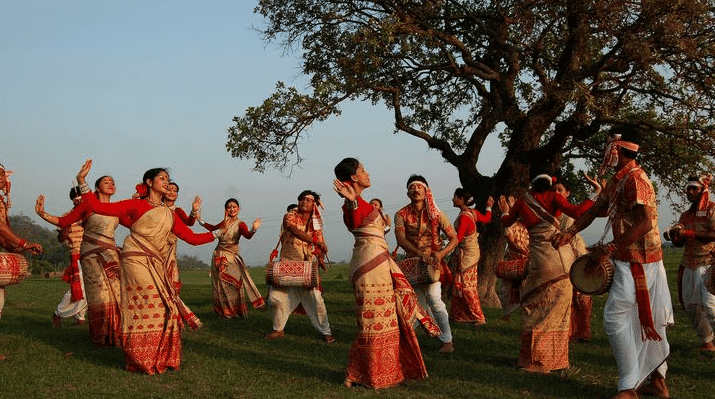
Why in News?
Rongali Bihu, also referred to as Bohag Bihu, is set to be celebrated throughout Assam from April 14 to April 20, 2025. This festival marks the Assamese New Year and the commencement of the harvesting season, making it a significant cultural event.
Key Takeaways
- Rongali Bihu is the most celebrated of the three Bihus in Assam, which also include Kati Bihu in October and Magh Bihu in January.
- The festival signifies the start of the Hindu solar calendar, celebrated as the Assamese New Year.
- Primarily a harvest festival, it symbolizes the beginning of spring and includes prayers for a fruitful agricultural season.
Additional Details
- Etymology: The term 'Rong' translates to joy in Assamese, highlighting the festival's vibrant and cheerful essence.
- Celebrations: The Bihu dance, a lively and energetic folk dance from Assam, is performed alongside traditional folk songs and instruments such as the dhol, pepa, gogona, toka, taal, and hutuli.
- Other Bihus:
- Festival: Timing and Significance
- April (Bohag): Start of sowing season, Assamese New Year
- October (Kati): Mid-crop season, prayers for good harvest
- January (Magh): End of harvest, community feasts
In summary, Rongali Bihu is a festival that not only marks the beginning of a new year but also emphasizes the importance of agriculture and community in Assamese culture. Its celebrations are filled with joy, music, dance, and a deep sense of gratitude for the harvest.
|
164 videos|800 docs|1156 tests
|
FAQs on History, Art and Culture: April 2025 Current Affairs - General Test Preparation for CUET UG - CUET Commerce
| 1. What are the main ideological differences between Ambedkar and Gandhi regarding social reform? |  |
| 2. How did Ambedkar and Gandhi approach the issue of untouchability? |  |
| 3. What was the impact of Ambedkar and Gandhi's differing ideologies on the Indian independence movement? |  |
| 4. How did Ambedkar and Gandhi's views on religion influence their social and political ideologies? |  |
| 5. What is the significance of celebrations like Jyotiba Phule Jayanti and Mahavir Jayanti in the context of Ambedkar and Gandhi's ideologies? |  |















